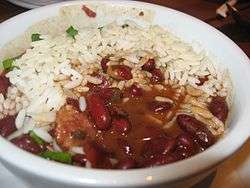Red beans and rice
|
Red beans and rice | |
| Place of origin | United States |
|---|---|
| Region or state | Louisiana |
| Main ingredients | Red beans, rice, onions, celery, bell pepper, pork bones, spices |
|
| |

Red beans and rice is an emblematic dish of Louisiana Creole cuisine (not originally of Cajun cuisine) traditionally made on Mondays with red beans,[1] vegetables (bell pepper, onion, and celery), spices (thyme, cayenne pepper, and bay leaf) and pork bones as left over from Sunday dinner, cooked together slowly in a pot and served over rice. Meats such as ham, sausage (most commonly andouille), and tasso ham are also frequently used in the dish. The dish is customary - ham was traditionally a Sunday meal and Monday was washday. A pot of beans could sit on the stove and simmer while the women were busy scrubbing clothes. The dish is now fairly common throughout the Southeast. Similar dishes are common in Latin American cuisine, including moros y cristianos and gallo pinto.
Red beans and rice is one of the few New Orleans style dishes to be commonly served both in people's homes and in restaurants. Many neighborhood restaurants continue to offer it as a Monday lunch special, usually with a side order of either smoked sausage or a pork chop. While Monday washdays are largely a thing of the past, red beans remain a staple for large gatherings such as Super Bowl and Mardi Gras parties. Indeed, red beans and rice is very much part of the New Orleans identity. New Orleanian Louis Armstrong's favorite food was red beans and rice - the musician would sign letters "Red Beans and Ricely Yours, Louis Armstrong".[2]
The vegetarian dish Rajma chawal[3] is very similar (which translates literally to red beans and rice), popular in North India. Red beans and rice is also a dietary staple in Central America, where it is known as "arroz con habichuelas". The dish is popular in Cuban, Puerto Rican, Dominican, Haitian and Jamaican cuisine as well.
Preparation
Red kidney beans or small red beans are used and they are usually (but not always) soaked beforehand.[4][5]
Nutritional significance
The dish is very nutritious. Rice is rich in starch, an excellent source of energy. Rice also has iron, vitamin B and protein. Beans also contain a good amount of iron and an even greater amount of protein than rice.[6] Together they make up a complete protein,[7] which provides each of the amino acids the body cannot make for itself.
In addition, rice and beans are common and affordable ingredients, often available in difficult economic times.
See also
References
- ↑ South Louisiana red beans — Southern U.S. Cuisine
- ↑ Liz Biro. From New Orleans to India, red beans and rice has been a weekly tradition for years. Star Online. 27 Feb. 2007.
- ↑ Rajma Chawal,Method of Cooking,Punjabi Rajma Chawal Recipe :Famous India
- ↑ Red Beans and Rice Recipe : Emeril Lagasse : Recipes : Food Network
- ↑ Red Beans and Rice Recipe : Alton Brown : Recipes : Food Network
- ↑ http://www.npr.org
- ↑ "Protein". http://www.cdc.gov. CDC. 2012-10-04. Retrieved 2014-04-07. External link in
|website=(help)
External links
- Beans and Rice - Southern U.S. Cuisine
- New Orleans Red Beans and Rice - The Gumbo Pages
- How To Make Red Beans and Rice Video - Cookbook Man
